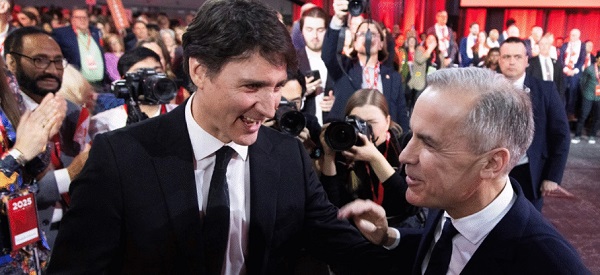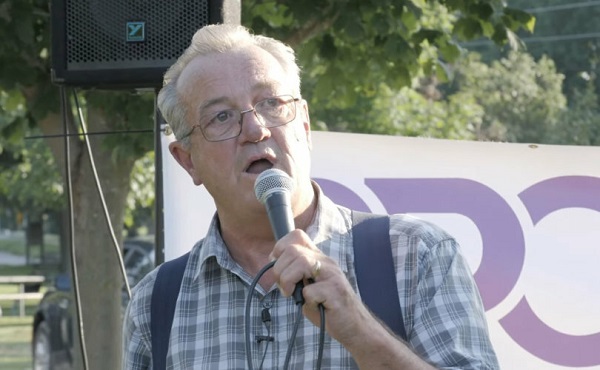Business
Carney’s Honeymoon Phase Enters a ‘Make-or-Break’ Week

From the National Citizens Coalition
The National Citizens Coalition (NCC) is sounding the alarm on a critical week for the Carney government, which, despite enjoying an unearned honeymoon in the polls, has delivered zero results for everyday Canadians. As the G7 summit looms large and the House of Commons prepares to adjourn, this is a make-or-break moment for Prime Minister Mark Carney to prove his government is more than empty promises. Canadians are watching, and the NCC is calling out the glaring failures that threaten a grim summer of economic decline, and continued crime, chaos, and rising unemployment.
Housing Minister Gregor Robertson Caught in $10.85 Million Scandal
Recent revelations from Blacklock’s Reporter expose Housing Minister Gregor Robertson’s attempt to conceal $10.85 million in personal property investments during Commons questioning. This shocking lack of transparency from the minister tasked with addressing Canada’s housing crisis raises serious questions about his integrity and ability to prioritize Canadians struggling with skyrocketing costs. While Robertson dodges accountability, and Carney apparently scoffs at providing housing relief to millions suffering under a Liberal-made crisis, young professionals and young families are wondering if they’ll ever have a chance to own a home bigger than Canada’s much-maligned supply of ‘dog-crate condos.’
The NCC demands a full ethics investigation, the resignation of Gregor Robertson — who, as one of the architects of the Vancouver housing crisis, should have never been handed this file to begin with — and immediate action to restore trust in this critical portfolio.
Pipeline Delays and Provincial Obstruction Threaten Economic Growth
The Carney government’s inaction on pipelines is stalling Canada’s economic potential. Despite promises of “nation-building projects,” British Columbia and Quebec continue to block and veto critical energy infrastructure, with Carney failing to assert federal leadership. His vague talk of “consensus” and “decarbonized” barrels has led to zero progress, leaving Alberta’s economy in limbo and Canadians facing higher energy costs. With no clear plan to advance projects, the government is squandering opportunities to create jobs and secure energy sovereignty. The NCC urges Carney to act decisively this week to break the provincial logjam and deliver results.
Immigration Chaos: Lena Diab’s Unchecked Honour System Fails Canadians
Immigration Minister Lena Diab’s reliance on an ‘honour system’ for millions of temporary visitors with expiring visas is a recipe for disaster. As Canada grapples with unsustainable immigration levels, Diab’s apparent plan for millions of temporary workers and failed ‘diploma mill’ attendees assumes compliance without enforcement, ignoring the high-propensity for fraud, and the ongoing and urgent strain on housing, healthcare, and public services. The Liberals’ Strong Borders Act promises reform, but its loaded with unnecessary overreach and vague measures.
A lack of urgency leaves Canadians vulnerable to further crime, chaos, closed emergency rooms, high rents, and failing infrastructure. With immigration continuing to spiral out of control, the NCC calls for concrete action to drastically lower immigration targets, expedite deportations, and prioritize Canadian citizens and the record amounts of unemployed before the House adjourns.
Canadians Deserve Results, Not More Hollow “Elbows up” or “Team Canada” Rhetoric
This week’s G7 summit in Alberta and the impending House adjournment are the Carney government’s last chance to show leadership, before an undeserved summer break for a government that will be overseeing deepening economic decline, rising crime under a refusal to tackle catch-and-release bail, and growing unemployment. Canadians cannot afford another season of unfulfilled promises and unchecked crises. The NCC demands Carney use the G7 platform to secure trade stability, meaningful energy deals with our allies, and table a federal budget to address the cost-of-living crisis made worse by inflationary Liberal spending. Failure to act now will cement an early legacy of inaction and leave Canadians to endure a prolonged period of hardship.
“The Carney government’s honeymoon has been built on hype, not results,” says NCC Director Alexander Brown. “From Gregor Robertson’s hidden millions, to stalled pipelines, to an immigration system in continued disarray, Canadians — and particularly young Canadians — are being let down. This week is Carney’s chance to prove he can deliver beyond the lies that were told to placate a portion of the electorate at the polls. If he fails to act, the economic decline, the crime and chaos, will only worsen, and everyday Canadians will pay the price.
“True Canadian leaders like Alberta Premier Danielle Smith are in attendance at the G7 along with Carney. If actual acts of ‘nation-building,’ and not more net-zero de-growth, do not come naturally to the PM, he should turn to those who have never wavered in their quest to make life more affordable for the hard-working citizens they are privileged to represent, and who know when to get out of the way to allow Canadians to prosper. More of the same internal, ideological sabotage from the Liberals cannot ruin this dire moment for Canada’s rebirth and recovery.”
The NCC calls on all Canadians to hold the Carney government accountable. Join us in demanding transparency, action, and results before the House adjourns and the G7 summit concludes. Together, we can fight for a stronger, more prosperous Canada.
About the National Citizens Coalition: Founded in 1967, the NCC is a non-profit organization dedicated to advocating for individual freedom, lower taxes, less government waste, and a stronger Canada. We hold governments accountable and fight for the interests of everyday Canadians.
Business
Canada Is Still Paying The Price For Trudeau’s Fiscal Delusions

From the Frontier Centre for Public Policy
By Lee Harding
Trudeau’s reckless spending has left Canadians with record debt, poorer services and no path back to a balanced budget.
It’s time for Canada to break free from Trudeau’s big-spending legacy. With soaring deficits, mounting debt, and stalled growth, we need a budget that cuts red tape, flattens taxes, and puts the economy first.
Justin Trudeau may be gone, but the economic consequences of his fiscal approach, chronic deficits, rising debt costs and stagnating growth, are still weighing heavily on Canada.
Before becoming prime minister, Justin Trudeau famously said, “The budget will balance itself.” He argued that if expenditures stayed the same, economic growth would drive higher tax revenues and eventually outpace spending. Voila–balance!
But while the theory may have been sound, Trudeau had no real intention of pursuing a balanced budget. In 2015, he campaigned on intentionally overspending and borrowing to build infrastructure, arguing that low interest rates made it the right time to run deficits.
This argument, weak in its concept, proved even more flawed in practice. Post-pandemic deficits have been horrendous, far exceeding the modest overspending initially promised. The budgetary deficit was $327.7 billion in 2020–21, $90.3 billion the year following, and between $35.3 billion and $61.9 billion in the years since.
Those formerly historically low interest rates are also gone now, partly because the federal government has spent so much. The original excuse for deficits has vanished, but the red ink and Canada’s infrastructure deficit remain.
For two decades, interest payments on federal debt steadily declined, falling from 24.6 per cent of government revenues in 1999–2000 to just 5.9 per cent in 2021–22, thanks largely to falling interest rates and prior fiscal restraint. But that trend has reversed. By 2023–24, payments surged past 10 per cent for the first time in over a decade, as rising interest rates collided with record federal debt built up under Trudeau.
Rising debt costs are only part of the story. Federal revenues aren’t what they could have been because Canada’s economy has stagnated. Population growth pads our overall GDP growth stats, but masks our productivity problem. From 2014 to 2022, Canada had near-lowest GDP growth among 30 countries in the Organization for Economic Co-operation and Development. Canada’s average growth rate during that period (0.6 per cent) was only ahead of Luxembourg (0.5 per cent) and Mexico (0.4 per cent).Why should a country like Canada, so blessed with natural resources and know-how, do so poorly? Capital investment has fled because our government has made onerous regulations, especially hindering our energy industry. In theory, there’s now a remedy. Thanks to new legislation, the Carney government can extend its magic sceptre to those who align with its agenda to fast-track major projects and bypass the labyrinth it created. But unless you’re onside, the red tape still strangles you.
But as the private sector withers under red tape, Ottawa’s civil service keeps ballooning. Some trimming has begun, rattling public sector unions. Still, Canada will be left with at least five times as many federal tax employees per capita as the U.S.
Canada also needs to ease its hell-bent pursuit of net-zero carbon emissions. Hydrocarbons still power the Canadian economy, from vehicles to home heating, and aren’t practically replaceable. Canada has already demonstrated that pursuing net-zero targets can result in near-zero per capita growth. Despite high immigration, the OECD projects Canada to have the lowest overall GDP growth from 2030 to 2060.
The Nov. 4 release of the federal budget is better late than never. So would be a plan to grow the economy, slash red tape and eliminate the deficit. But we’re unlikely to get one.
Lee Harding is a research fellow with the Frontier Centre for Public Policy.
Business
Canadians responsible for $2.3 trillion in government debt: Every single person in Alberta owes $40,939

From the Fraser Institute
By Jake Fuss, Tegan Hill and William Dunstan
The Carney government plans to table its long-awaited federal budget on Nov. 4. In the summer, Prime Minister Carney announced billions of dollars in new spending that could push this year’s federal deficit above $90 billion, which would add significantly to the federal debt.
Indeed, the federal government, and the provincial governments, have racked up mountains of debt over the past decade and a half, with no end in sight.
According to a recent study, combined federal and provincial government net debt (total debt minus financial assets) nearly doubled (inflation-adjusted) from $1.2 trillion in 2007/08 to a projected $2.3 trillion at the end of 2024/25.
Putting this debt in per-person terms helps illustrate its scale.
Combined provincial and federal net debt per person ranges from a low of $40,939 in Alberta to a high of $68,861 in Newfoundland and Labrador. Combined federal and provincial net debt represents total provincial net debt plus each province’s share of federal net debt, which the study allocated to each province based on a five-year average (2020-2024) of their share of Canada’s population.
Of course, Canadians are ultimately responsible for financing this debt. Indeed, governments, like households, must pay interest on their debt, and taxpayers fund these debt interest payments. When tax dollars are spent on debt interest payments, those same dollars cannot be spent on important programs such as health care or used to provide tax relief.
The federal government spent a projected $53.8 billion on debt interest payments in 2024/25, more than it spent on the Canada Health Transfer ($52.1 billion), which supports provincial health-care systems. For many provinces, debt interest costs are the fourth-largest expense after health care, education and social services.
Many governments do not plan to stop adding to their net debt. Federally, the government’s recent tax and spending commitments will likely result in deficits of more than $70 billion each year through 2028/29. Additionally, six provinces—Alberta, British Columbia, Quebec, New Brunswick, Nova Scotia and Prince Edward Island—project budget deficits each year from 2025/26 to 2027/28. All provinces except Saskatchewan project deficits in 2025/26.
But there’s good news. Past governments have shown it’s possible to restrain spending and reduce debt. In fact, the 2008/09 recession marked a turning point for government deficits and debt in Canada. From the mid-1990s to the late-2000s, it was a different story, as the federal government and many provincial governments sought to restrain spending, balance their budgets and limit debt accumulation.
But now and for many years, many governments across Canada have run deficits and accumulated debt, at great cost to taxpayers. It’s time governments develop real plans to address their ballooning debt burdens. The upcoming Carney budget is a good place to start.
-

 armed forces19 hours ago
armed forces19 hours agoSecretive Lockheed Martin Skunk Works reveals latest high-tech military drone
-

 International18 hours ago
International18 hours agoEverything has changed. Again.
-

 Bruce Dowbiggin2 days ago
Bruce Dowbiggin2 days agoWhat We Had Here Is A Failure To Communicate
-

 Business1 day ago
Business1 day agoGun Buyback Program creating criminals out of law abiding citizens and directing police away from actual crime
-

 Daily Caller2 days ago
Daily Caller2 days ago‘Let’s Have A Trial’: Comey Responds To Indictment
-

 Business2 days ago
Business2 days agoCritics Accuse YouTube of Dragging Out Return Process for Banned Channels
-

 Censorship Industrial Complex2 days ago
Censorship Industrial Complex2 days agoConservative MP Leslyn Lewis warns Liberals’ ‘hate’ bill will allow for prosecution of free speech
-

 Opinion1 day ago
Opinion1 day agoThe City of Red Deer’s financial mess – KPMG report outlines failure of council to control spending






